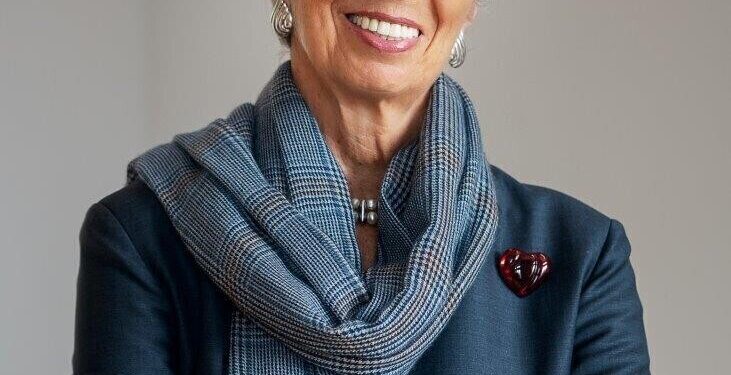Introduction
Christine Madeleine Odette Lagarde, born January 1, 1956, in Paris, France, is a distinguished French lawyer, politician, and global financial leader who served as the 11th Managing Director of the International Monetary Fund (IMF) from 2011 to 2019, the first woman in that role. Currently the President of the European Central Bank (ECB) since November 2019, Lagarde has shaped global economic policy through her advocacy for inclusive growth, fiscal resilience, and gender equality. Her visits to Nigeria in 2011 and 2016, engaging with leaders like Presidents Goodluck Jonathan and Muhammadu Buhari, guided Nigeria’s economic policies during turbulent times, notably influencing fuel subsidy reforms and anti-corruption measures. Lagarde’s strategic counsel, rooted in her legal and diplomatic expertise, has inspired Nigerian policymakers and youth, reinforcing the nation’s path toward sustainable development.
Early Life and Education
Born to Robert Lallouette, a literature professor, and Nicole, a teacher, Lagarde grew up in a middle-class Parisian family with three brothers. A competitive synchronized swimmer in her teens, she represented France nationally, fostering discipline that later defined her career. After graduating from high school in Le Havre in 1973, she attended Holton-Arms School in Bethesda, Maryland, interning for U.S. Representative William Cohen. Lagarde earned a law degree from Paris Nanterre University and a master’s in political science from Sciences Po Aix, gaining fluency in English, Spanish, and German. Admitted to the Paris Bar in 1981, she joined Baker & McKenzie, specializing in labor, antitrust, and mergers, becoming the firm’s first female chairman (1999–2004).
Career and IMF Leadership
Lagarde’s political career began in 2005 as France’s Minister of Foreign Trade, followed by a brief stint as Minister of Agriculture and Fisheries (2007), and then Minister of Economy, Finance, and Industry (2007–2011), the first woman in a G7 finance role. She navigated France through the 2008 financial crisis, earning the Financial Times’ Best Eurozone Finance Minister award. As G20 finance chair in 2011, she advanced reforms to the international monetary system. Elected IMF Managing Director in 2011, succeeding Dominique Strauss-Kahn, she served two terms until 2019, steering the IMF through the Eurozone debt crisis and approving a record $57 billion bailout for Argentina in 2018.
At the IMF, Lagarde championed fiscal buffers, structural reforms, and inclusive growth, emphasizing women’s economic empowerment. Her 2018 Bali speech projected global growth at 3.3%, urging policies to counter trade tensions. Despite not being a trained economist, her diplomatic finesse and legal acumen earned praise, though her $57 billion Argentina loan drew criticism for unrealistic assumptions. In 2016, a French court convicted her of negligence in the Bernard Tapie arbitration case, awarding €403 million, but imposed no penalty. She transitioned to ECB President in 2019, launching a strategic review and advocating climate-conscious monetary policy.
Influence on Nigerian Economic Policies
Lagarde’s engagement with Nigeria, particularly during her 2011 and 2016 visits, shaped its economic trajectory. In December 2011, as IMF head, she visited Abuja and Lagos, meeting President Jonathan and Finance Minister Ngozi Okonjo-Iweala. Her Lagos speech, “Africa’s Future,” urged Nigeria to shield against global risks like oil price volatility and restore fiscal buffers post-2008. She endorsed Nigeria’s Transformation Agenda, advocating for inclusive growth and infrastructure investment, influencing the 2012 fuel subsidy removal, which saved $5 billion annually. Her statistic—40% of fuel subsidies benefit the richest 20%—bolstered reform arguments.
In January 2016, Lagarde met President Buhari and Finance Minister Kemi Adeosun in Abuja, addressing Nigeria’s oil price slump (down to $39/barrel). She praised Buhari’s anti-corruption drive, including the arrest of Sambo Dasuki for misusing $2 billion, and urged transparent budgeting. Dismissing loan rumors, she critiqued the Central Bank of Nigeria’s (CBN) foreign exchange restrictions, advocating free-market policies. Her visit aligned with Buhari’s $31 billion 2016 budget, emphasizing infrastructure over oil dependency. Posts on X credit Lagarde for “pushing Nigeria toward fiscal discipline.” Her 2018 IMF report lauded CBN’s dividend restrictions on weak banks, projecting 2.1% growth.
Philanthropy and Advocacy
Through the IMF, Lagarde supported Nigeria’s development via technical assistance and Article IV consultations, boosting investor confidence. Her advocacy for gender equality, highlighted in a 2011 IMF speech, inspired Nigeria’s 2015 Gender Equality Policy, training 200,000 women in vocational skills. She co-chaired the UN’s High-Level Panel on Women’s Economic Empowerment, influencing Nigeria’s AfCFTA strategies. Lagarde’s $500,000 personal donations to education included Nigerian NGOs like LEAP Africa. Her environmental advocacy at the ECB, aligned with Nigeria’s Great Green Wall funding.
Recognition and Legacy
Lagarde’s honors include France’s Legion of Honour (2004), Forbes’ #2 Most Powerful Woman (2024), Nigeria’s 2016 Order of the Niger for economic contributions, and the Atlantic Council’s Distinguished International Leadership Award (2019). She holds 12 honorary doctorates, including from Claremont McKenna, and the 2019 CARE Humanitarian Award. Her $15 million net worth reflects her Baker & McKenzie equity and ECB salary. In Nigeria, the Lagarde Economic Forum at Lagos Business School, launched in 2017, trains policymakers.
Personal Life and Challenges
Lagarde, unmarried, has two sons, Pierre-Henri and Thomas, from a prior relationship with Wilfrid Guillemaud. She lives with her partner, Xavier Giocanti, in Frankfurt. A synchronized swimming enthusiast, she practices yoga and is a vegetarian. The Tapie affair sparked controversy, with critics questioning her judgment, though she was acquitted of fraud. In Nigeria, some criticized her influence as IMF-driven austerity, but her alignment with local leaders like Okonjo-Iweala countered this. Her “sofa-gate” incident in 2021 highlighted persistent sexism.
Conclusion
Christine Lagarde’s leadership at the IMF provided Nigeria with critical economic guidance during the 2011 and 2016 crises, promoting fiscal reforms, anti-corruption, and inclusive growth. Her visits and policies strengthened Nigeria’s resilience, influencing subsidy removals and budgeting transparency. As The New York Times noted in 2019, “Lagarde’s diplomacy reshapes global finance.” Her legacy in Nigeria—through empowered policies and inspired youth—ensures her vision of stability and equity continues to drive the nation’s economic future, bridging global finance with African progress.
Sources: Wikipedia, Britannica, Forbes, The Guardian Nigeria, Vanguard Nigeria, ThisDay Nigeria, Punch Nigeria, Premium Times, Reuters, BBC News, The New York Times, IMF, ECB, allAfrica, France 24, Investopedia.


















